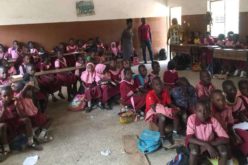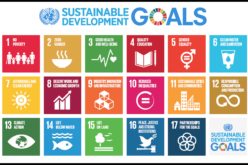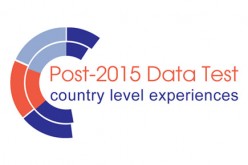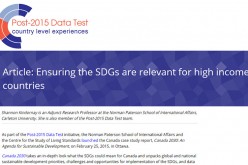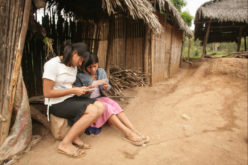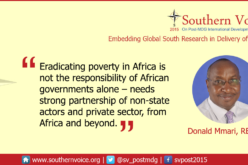Moving beyond Limited Access Orders: towards a post-2015 MDG agenda
This post is written by Shehryar Toru, researcher at SDPI in Pakistan, part of the Southern Voice Initiative. In this post, he challenges how goals and targets are currently designed.
As the deadline of the Millennium Development Goals is fast approaching, progress on several goals has been widely debated. The UN’s Millennium Development Goals Report 2013 claims that several development targets have been or will be achieved. However, opponents criticise the over-ambitious targets of the MDGs, and argue that the achievements made should be credited to the export-driven economic growth and industrialisation of countries like India and China.
The progress on MDGs is rather dismal in the context of Pakistan. With the exception of Goal 7, progress on all other indicators is “off-track”, and goals are unlikely to be met by the end of 2015. A national report by the Commonwealth Foundation on A civil society review of progress towards the Millennium Development Goals in Commonwealth countries identifies some important factors concerning the failure of MDGs in Pakistan.
In addition to the doubtful quality of data being produced on MDGs, which conforms to the current debate on data revolution, the institutional challenges were highlighted the most. The report further suggests that the MDGs have not been effectively embedded into the institutional infrastructure, demonstrated by the insufficient empowerment of the MDG secretariat the Planning Commission. It also indicates the lack of political will and public ownership of the MDGs in Pakistan.
The UNDP-led national consultations in Pakistan also proposed a list of priority areas for the post-2015 agenda. These Pakistan-specific consultations involved around 22,000 people from all walks of life including the civil society, academia, parliament, farmers, and religious minorities. Peace and security and governance were accorded high importance, and identified as the main barriers to the achievement of MDGs. The lack of transparency, ineffective accountability and inefficient rule of law have been identified as the major governance challenges. Moreover, the under-protected rights of the marginalised population are argued to be exploited by the political and economic elites.
Governance problems in Pakistan are part and parcel of the state and society, termed as the informal institutions. These informal institutions have a profound impact on the way the formal institutions behave, and thus influence their course of action. The challenges of transparency, accountability, political will along with many others are in fact the product of this socio-political environment (created by informal institutions). Therefore, an understanding of these informal institutions is vital to ensuring that the developmental policies are in line with MDGs in Pakistan.
An interesting framework put forward by Nobel Laureate Douglas North et al makes reference to two social orders – limited access and open access orders – on the basis of informal institutions. Patronage rights, clientelistic networks, limited access to political and economic resources, coalition among elites to maintain status quo, lack of political will for policy reforms are the defining characteristics of limited access states in Pakistan and many other developing countries across the globe. The political and economic elites in these countries, make coalition on the basis of cooperation and patron-client relationships to limit access to valuable resources (land, labour, capital, etc.), and to activities (such as contract enforcement, property right enforcement, trade, worship, etc). The dominant coalitions in limited access states suppress competition and create rents through exclusive rights and privileges.
In order to achieve MDGs, developing countries are often required to implement policy reforms at different levels and along different dimensions. Since these policy reforms challenges the status quo in terms of reducing rent-creation opportunities for the dominant coalition; they are often opposed and destined to failure. This is consistent with the Commonwealth Foundation report’s findings of ‘lack of political will’ and ‘underpowered MDG secretariat at Planning Commission’.
Merilee Grindle, provides an interesting evidence of this sort of opposition in 1990s education reforms of Latin America in her book “Despite the Odds: The Contentious Politics of Education Reform”. She observed that the reforms had at least short-term disadvantage to the politically important group of teacher unions. Many of these powerful unions colonised the ministries and achieved privileged positions in areas where personnel decisions were made. As a consequence, the unions expressed strong opposition by shutting down schools and ministries, organising protests and strikes, and paralysing government decision making. Therefore, without complete understanding and consideration of these state-specific socio-political and institutional dynamics, it is very improbable that policy reforms in developing countries will render desired goals.
Hence, for the post-2015 agenda, the UN should make a transition from the normative framework of over-optimistic, generic goals to country-specific and sector-precise policy guidelines by taking into consideration the informal social norms influencing the local political, economic and institutional environment. Since the MDGs are supported by colossal financial aid, efforts could be made to keep the institutional players accountable for MDGs goals.
Moreover, country-specific rigorous empirical evidences are required to identify the set of informal institutions and their practical mechanisms of reform-opposition in order to influence evidence-based policy guidelines.
We would like to invite fellow Southern Voices experts and other researchers to provide critical feedback on the above proposition.
1,261 total views, 3 views today




